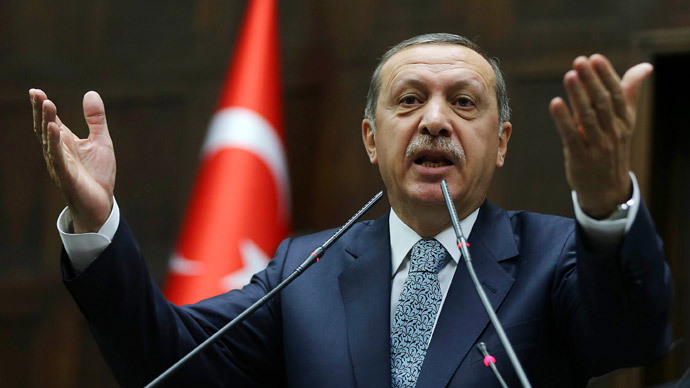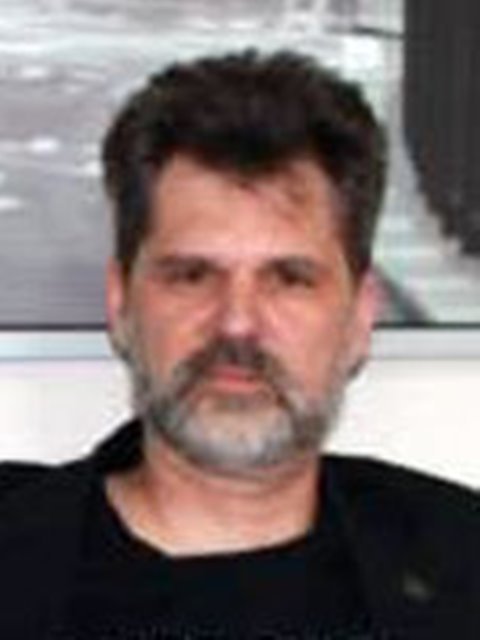Tayyip's Praetorian Guard or the new Turkish surveillance state

Turkey is closer than ever to not just replicate the exploits of America's National Security Agency, but also to actively participate in President Obama's war on whistleblowers.
Turkey's current political leadership has been going through a severe crisis ever since corruption allegations emerged on Dec. 17. Bribery charges and shoeboxes filled with money provided catchy sound bites that are still being reiterated today. In conjunction with these embarrassing "facts" coming to light, Turkey's involvement in neighboring Syria's bloody war has also been in the spotlight of late – particularly, the scandal involving trucks carrying either "humanitarian aid" or "weapons and ammunition" into Syria, as part of Turkey's National Intelligence Organization’s (MIT) secret mission. Founded in 1965, the MIT is tasked to collect intelligence to do with threats to the country and the nation's integrity and security. It reports to the prime minister, the president and the chief of the General Staff.
On Feb. 26, Turkish Prime Minister Recep Tayyip Erdogan approved a new law that gives "broader powers for [Erdogan's] intelligence agency, including more scope for eavesdropping and legal immunity for its top agent," Reuters correspondent Orhan Coskun reported, after it was approved by Turkey's parliament Sunday.
This public scrutiny of a body directly attached to the figure of the prime minister by means of laws #644 (1965) and #2,937 (1984) has prompted the present incumbent, Recep Tayyip Erdogan, well-known for his tendency to micro-manage Turkey's business and other affairs, to undertake a far-reaching revision by means of a law proposal. This legal adjustment, tabled by the MPs İdris Sahin and Alpaslan Kavaklıoglu late Wednesday, Feb. 19, proposed changes among other things would allow Turkey's intelligence officers (MIT) to perform operations abroad and listen to international telephone conversations. In addition to somewhat copying actions carried out by the now more than infamous NSA, Sahin and Kavaklıoglu's proposals would also stipulate jail terms of up to 12 years for the publication of leaked documents.
In this way, Turkey would not just be replicating the exploits of America's National Security Agency, but even actively participate in President Obama's war on whistleblowers. The bill would thus also force official institutions as well as private companies to surrender consumer data and technical equipment. In fact, at the beginning of December 2013, the prime minister expressed his feelings on the topic, explaining that "[e]xposing state secrets is not freedom but absolutely treason to the country and homeland." The new MIT measures are meant to bring Turkey's intelligence agency "in line with the requirements of the [current] age, grant it the capabilities of other intelligence agencies, and increase its methods and capacity for individual and technical intelligence [gathering]," the bill says. Sahin and Kavaklioglu's proposals would thus create a direct link between the Turkish and US governments.

The recently introduced internet bill allows the Turkish government to shut down websites purveying undesired information, but stops short of mandating surveillance of Turkish users' internet traffic. Still, some EU officials expressed grave concerns, while the US State Department spokeswoman Katherine Pfaff was led to declare the following in this connection: "As the Turkish government evaluates its approach to internet freedom, we hope the highest standards of openness and free expression will be protected."
Statements like this have led the recently-appointed European Union Minister and chief negotiator Mevlut Cavusoglu to retort that the "US is well-known for its Internet restrictions, especially regarding Wikileaks," appearing on the Turkish news television channel NTV. Cavusoglu went on that "[t]here are a total of 34 new regulation proposals in the draft [internet] bill, eight of them came from the European Union. Five of those proposals [are] directly reflected in the bill, two of them indirectly. Still, the EU is talking about rule of law, separation of powers, democracy and human rights."
Sahin and Kavaklıoglu's proposed amendments to the MIT law would increase the Turkish state's surveillance capabilities, but these would still fall very short from the reach the law enjoys in the US. Last summer, for example, the Catalano family living in New York was visited by a "joint terrorism task force," in the words of Michele Catalano. The family's combined internet searches, involving pressure cookers, backpacks, and information on the Boston bombings, led to six police investigators visiting the family home and interrogating her husband. Turkey's new internet legislation and the changes to the MIT law could not possibly lead to a similar scenario on Turkish soil?
Fortuitously, the US President called Tayyip Erdogan on the same day as the bill was being presented. The White House released a statement indicating that "President Obama spoke by phone with Prime Minister Erdogan of Turkey on a range of bilateral and regional issues. The President affirmed the value he places on a strong, mutually respectful bilateral relationship with the Republic of Turkey and expressed his view that Turkey can demonstrate leadership in the world through positive engagement." The US thus appears to be at pains to placate its Muslim ally to act swiftly with regard to the ongoing corruption allegations so as not to undermine the healthy business relations enjoyed by Turkey over the past decade.
In this way, Barack Obama seems to be expressing his approval of what I have termed “Turkey's pseudo-Ottoman policy” with regard to the erstwhile Ottoman hinterland and beyond. On a related note, the two leaders also discussed the war in Syria, underlining support for "continuing efforts to advance a political solution to the Syria conflict." But the two men also spoke at length about the energy relationship between Ankara, Erbil, and Baghdad – an indication that Turkey's pseudo-Ottoman ambitions to acquire a significant stake in a regional part of Pipelineistan are also being followed closely by Washington.
The central Iraqi government is weary of Turkey's rapprochement to the KRG and its oil and gas wealth and therefore appears willing to offer Ankara another sweet deal. Besim Sisman, deputy director general of the Turkish Petrol Corporation (TPAO) stated on the record that "We have experienced no problems [with Iraq's central government]. The negotations were positive. We proposed to prospect [for oil] in the area of Mansouria. [And they] accepted." In the words of the collaborative Oil, Gas & Energy news site A Barrel Full, Mansouria is the second important field in Diyala province near the Iranian border – 29 kilometers long and 5 kilometers wide. Originally discovered in 1978, the site contains 4 wells with a reserve of 4.5 trillion standard cubic meters. And now TPAO will be prospecting for other potential wells, investing $1.5 billion in the process.

Even though Erdogan and Obama covered a lot of ground during their telephone conversation, the topic of Sahin and Kavaklıoglu's proposals was notably absent from their discussions. On Thursday, February 20, the opposition newspaper Taraf said that the new MIT law would transform Turkey into an "intelligence state," not unlike the US under Obama. The NSA surveillance programs, as revealed by whistleblower Edward Snowden, actually transcend the borders of the US and, for instance, also target telephone calls made by German Chancellor Angela Merkel and even Turkey's Erdogan. As noted above, the internet in the US is equally part of the elaborate surveillance network wielded by the authorities, which is yet another area where Erdogan's Turkey appears willing to follow the American lead. But even though nowadays, more and more voices are becoming heard using the adjective Orwellian in connection with the Obama administration, the president himself recently tried to put the public at ease: "The challenges to our privacy do not come from government alone... Corporations of all shapes and sizes track what you buy, store and analyze our data, and use it for commercial purposes."
The new internet bill in tandem with the new MIT law would undoubtedly transform Turkey into an "intelligence" and "surveillance state," somewhat rivaling the US. Ever since the days of Prime Minister (and later President) Turgut Özal (1927-93), the Republic of Turkey has been trying hard to transform itself into a "little America" in its own right. Özal's free market and Islam-friendly policies in many ways stand at the root of the current AKP-led government's success and prosperity. In his day, Özal was a close friend and ally of George H.W Bush and Tayyip Erdogan appears to be emulating his predecessor in this respect as well, cozying up to Obama and trying to turn Turkey into a Muslim nanny state with access to the latest state-of-the-art surveillance infrastructure and technology.
In the course of the discussions of the new law, Deputy Prime Minister Besir Atalay even divulged that Turkey's "National Intelligence Organization (MIT) eavesdrops on 2,473 people. More than half of them are foreigners." And with these now-accepted changes, MIT's reach will only increase – in effect turning the National Intelligence Organization into the Prime Minister's Praetorian Guard. As such, the opposition politician Engin Altay (CHP) expressed this view as well, saying that the "prime minister is completely getting rid of the principle of accountability...The MIT is becoming his private organization. This is a transition from police state to intelligence state." Earlier the government already proposed to rein in the powers of the judiciary, by means of a law tightening control over the High Council of Judges and Prosecutors (HSYK), the body appointing Turkey's judicial watchmen.
Against the backdrop of these clear moves to turn Turkey into a tightly-controlled, quasi-Orwellian "little America," recordings incriminating the prime minister and his son Bilal have emerged. As a result, Turkey's media and the Turkish population are at present trying to come to grips with a political class trying to extend its hold on power, while being embroiled in an ever-widening corruption scandal, which, in turn, appears to be but a pretext for a power struggle behind the scenes. The upcoming local elections and the scheduled presidential poll later this year will reveal the direction Turkey will take in the coming years. Will it be steady as she goes or instead a course that would see a return of Turkey's self-proclaimed secularist political class?
The statements, views and opinions expressed in this column are solely those of the author and do not necessarily represent those of RT.
The statements, views and opinions expressed in this column are solely those of the author and do not necessarily represent those of RT.













